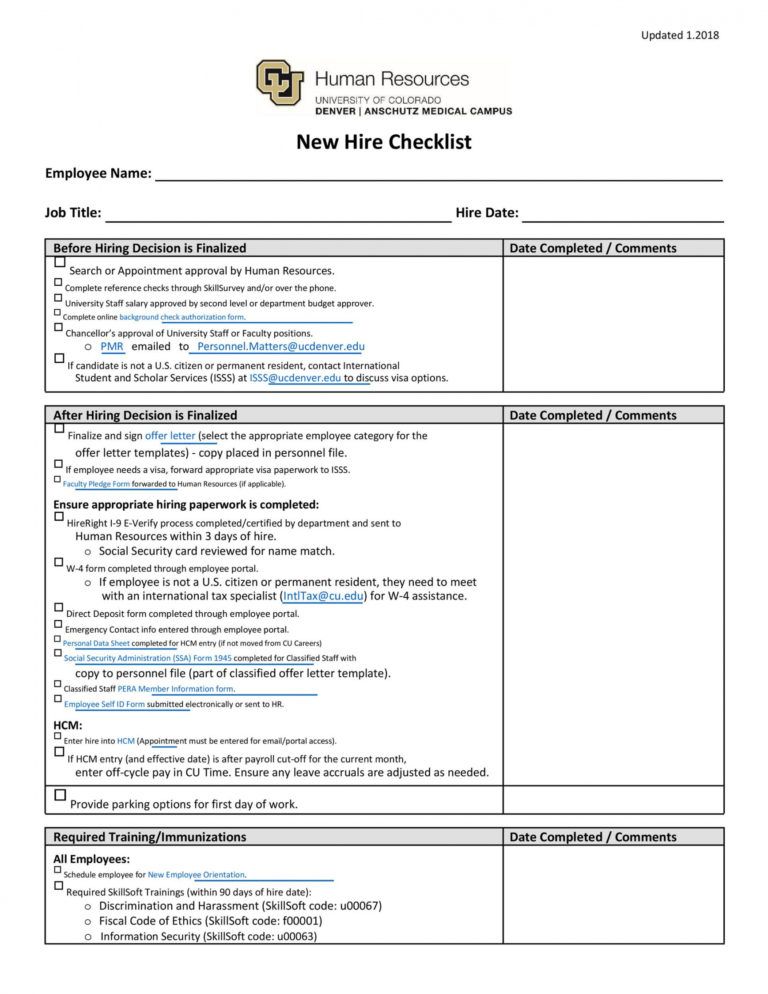Essential Paperwork for New Employees: A Checklist

Starting a new job can be an exciting yet overwhelming experience. Among the myriad of things new employees need to manage, sorting out the necessary paperwork might feel daunting. This guide aims to demystify the process by offering a comprehensive checklist of essential paperwork for new hires, ensuring a smooth onboarding process for both the employee and the employer.
Employment Contract

The cornerstone of any employment relationship is the employment contract. Here's what should be included:
- Job Title and Description: Clearly outlines the role and responsibilities.
- Start Date: When the employment officially begins.
- Salary or Compensation: Details of wages, bonuses, or commission structures.
- Hours of Work: Expected working hours, overtime rules.
- Leave Entitlements: Information on vacation time, sick leave, and other forms of leave.
- Termination Clause: How either party can end the employment relationship.
- Confidentiality Agreement: Agreements on handling sensitive company information.
🔍 Note: Always ensure that you understand every part of your employment contract before signing. Seek clarification or legal advice if necessary.
Tax Documents

Completing tax-related documents is crucial for lawful employment. Here are the key documents:
- W-4 Form (USA): For tax withholding purposes, determining how much tax will be withheld from each paycheck.
- State Tax Forms: Depending on location, there might be state-specific tax forms.
- I-9 Form (USA): Verifies the employee's identity and eligibility to work in the country.
- Social Security Number: Necessary for tax reporting and withholding.
| Document | Description | Purpose |
|---|---|---|
| W-4 Form | Tax withholding allowance certificate | To determine income tax withholding |
| I-9 Form | Employment Eligibility Verification | To ensure compliance with employment laws |
| State Tax Forms | Varies by state | To comply with state-specific tax obligations |
| Social Security Number | Identification Number | For tax purposes and payroll tracking |

Benefits Enrollment

Employees should be provided with options to enroll in company benefits:
- Health Insurance: Details of medical, dental, and vision coverage options.
- Retirement Plans: Information on 401(k) or similar retirement savings plans.
- Life and Disability Insurance: Details on optional insurance plans.
- Employee Assistance Programs (EAP): Coverage for counseling and other support services.
Remember to inquire about the deadlines for enrollment and any associated costs or contributions you might need to make.
📝 Note: Choosing benefits wisely can save significant money and provide essential protections. Take the time to understand each option.
Company Policies and Handbooks

Getting acquainted with company policies is crucial:
- Employee Handbook: A guide to company culture, policies, and procedures.
- Code of Conduct: Standards of behavior expected from employees.
- Safety Protocols: Procedures to follow in emergencies or regarding health and safety.
- Non-compete and Non-solicitation Agreements: Restrictions on competition after leaving the company.
These documents outline the ground rules for your employment, helping you understand what's expected from you as an employee.
Direct Deposit Authorization

To facilitate salary payments, employees are usually required to fill out:
- Direct Deposit Form: To deposit wages directly into your bank account.
- Bank Details: Account number and routing information.
- Payroll Frequency: How often you will be paid.
Ensure accuracy in these details to avoid payment issues.
Work Eligibility and Immigration

If applicable:
- Work Permits or Visas: If not a citizen or legal resident, documents proving work eligibility.
- Green Card (if applicable): Documentation for those with permanent residency status.
These are critical for those not naturally eligible to work in the country without additional documentation.
What if I don't understand something in my employment contract?

+
It's highly advisable to ask for clarification or seek legal advice to ensure you fully understand the terms of your contract.
How do I know if I am eligible for the company's health insurance plan?

+
Eligibility often depends on your employment status and hours worked. Check your employment contract or speak with HR for specific details.
What should I do if my I-9 or similar work eligibility documents are not accepted?

+
Reach out to HR for guidance. They can provide you with the correct documentation or alternative acceptable forms of ID.
Can I change my direct deposit information after I've submitted it?

+
Yes, you can typically change this information anytime, but it's best to notify HR or payroll well in advance of your next payday.
Remember that navigating new employment paperwork doesn’t have to be an uphill battle. With this detailed checklist, new employees can confidently tackle the administrative tasks of starting a new job. Ensuring all documents are in order not only helps in seamless integration into the company’s structure but also lays the foundation for a successful and compliant work relationship.



